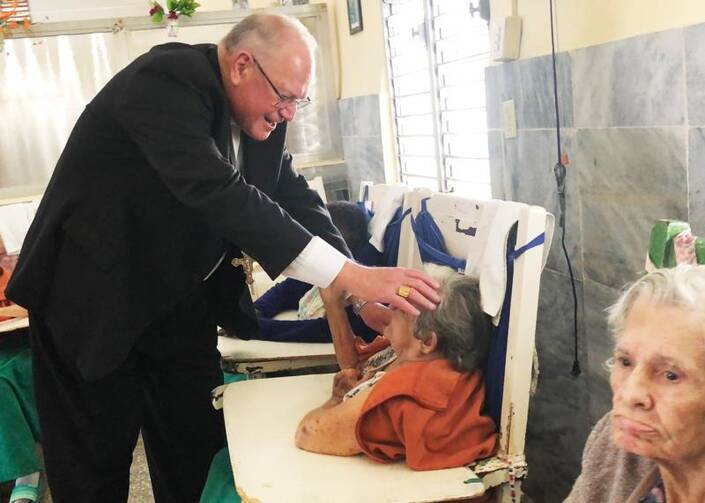HAVANA (CNS) -- Though there's a great distance from New York to Cuba, sharing the Eucharist with other Catholics on the island is a great reminder of the bonds of faith and love and what the church can build even among people who are different, New York Cardinal Timothy M. Dolan said Feb. 10.
"It is very clear to us, the visitors, that we are at home here," he said during his first Mass in the Cuban capital of Havana.
"We are specially at home when we are at the family table," the cardinal said, referring to the celebration of the Eucharist during a homily at the chapel of Hogar Santovenia, a center where members of the Catholic Church, including women religious, care for the elderly in Havana.
It felt so much like home that a man in the choir suddenly broke into a flute rendition of "Ave Maria" at the end of the Mass, after which the cardinal turned to face a statue of Our Lady of Charity of El Cobre, the country's revered patron saint, while the man finished playing.
"Que viva la Virgen de la Caridad!" the cardinal then shouted in Spanish, followed by great applause from the elders.
The cardinal's spontaneity has played well among the Catholic Cubans he has visited during his six-day mission trip, his first to the island, as well as church-run centers or organizations he has toured.
"Your affection gives us encouragement," said Maritza Sanchez Abillud, director of Caritas Cuba, who met with the cardinal during his first full day in Havana to talk about the programs the organization provides, particularly tending to the island's aging population.
"We remember how our faith unites us, but our charity also unites us," Cardinal Dolan said to Sanchez, who spoke to him about some of the difficulties of trying to help when materials on the island are scarce.
Aside from the visit to the Caritas Havana office, the cardinal and his small entourage -- which also included Msgr. Kevin Sullivan, executive director of Catholic Charities for the Archdiocese of New York, and Auxiliary Bishop Octavio Cisneros of Brooklyn, New York -- also visited a facility where a small group of Guatemalan women religious, members of the Congregation of Mary and Martha, care for aging or sick priests, and the Vatican embassy, or nunciature, on the island.
During an evening Mass at Havana's cathedral, he was joined by Cuban Cardinal Juan Garcia Rodriguez of Havana; Bishop Juan Hernandez Ruiz of Pinar del Rio; Bishop Emilio Aranguren Echeverria of Holguin, who is the head of the Cuban bishops' conference; and Archbishop Giampiero Gloder, the Vatican's nuncio to Cuba.
At the cathedral, Cardinal Dolan continued the sentiment he had expressed at each of the places he visited: that even though his Spanish wasn't perfect, he was "very, very happy" to be in Cuba to share with those in the church who are doing good works there, despite difficulties. He referenced the first reading for that day from the First Book of Kings, which spoke of the dedication of the Jerusalem temple.
The temple in Jerusalem brought people together, he said. He referenced how the Havana cathedral, too, served the same purpose. Earlier he had mentioned the presence of a small group of government officials at the evening Mass.
"And here we are, here in this magnificent, historic temple that is the center of unity in the church that has brought people together in love in faith and worship for centuries," he said. "Here is the arc of the covenant, with God's holy word and the real presence of Jesus in the holy Eucharist."
Jesus taught his disciples to help the poor and the sick, Cardinal Dolan said.
"The church tries to do what Jesus did and, in Cuba, I have been so inspired" to see the same take place, he said.
"Here, I see the church do what Jesus did in helping the old, the sick and the poor," and simply doing what Jesus asked, he said.
Carrying out those teachings of being of service to others reminds the followers of Christ of the sacredness of human life and the dignity of every human person, he said, and it is part of the universal church, whether in Cuba or New York.
Cardinal Garcia thanked him for his visit and said the church in Cuba feels one with the church in the U.S.
"We have the same faith in God," he said, and that helps carry out the church's teachings including the belief in the wonder that is marriage, the defense of life, practicing the corporal and spiritual works of mercy and the church's social doctrine. He also said Cuba had the joy of having priests in the U.S. and jokingly said he was hoping the cardinal would send some missionary priests from New York to Cuba.
"Thank you for your testimony, your prayers, your aid and cooperation," Cardinal Garcia said, telling the New York cardinal jokingly that seminarians were "angry" at him for not bringing along copies of his book for them.
"It all sold out," the cardinal replied.










